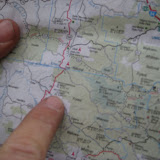Greetings from Ulaanbaatar, the capital city of Mongolia!
The collapse of the Soviet empire hasn’t been kind to Mongolia. Prior to the collapse of communism and the restructuring of the USSR (AKA the complete pull out from all their satellite states) Mongolia was left to its own means and had to quickly adapt. Unfortunately what resulted was far more than a few growing pains. You can’t simply convert overnight from a totalitarian regime, one in which the State provides for, controls and is involved with every aspect of your life, to a market economy and your own unique version of democracy. The job they’ve done is incredible but along the way there’s been corruption, grinding poverty, soaring unemployment and steady deterioration of infrastructure. But through all this the Mongolian people have endured. With stoic perseverance and grim determination they’re moved on.
Next to crumbling monolithic soviet era apartment blocks and the severe, imposing facades of numerous government buildings you’ll also find new hotels, cranes dotting the skyline and construction literally everywhere. And between these imposing buildings you’ll find shops. Shops of every kind and every description – many of them the retail outlets for various co-op’s. Fleece co-ops, wool co-ops, handi-craft co-ops and everything in between. Co-ops made up of rural nomadic herders, established co-ops for the manufacturing and service sector and recently since 1990, financial co-ops operating as small, grass-roots credit unions providing loans a deposit services to the poor and disenfranchised that can’t otherwise get these services from the many commercial banks that can now dot the landscape.
The co-operative movement is very much alive in Mongolia. I don’t say alive and well, because it’s struggling but it’s still here and has no intention of folding camp anytime soon.
The co-operative movement in Mongolia goes back to the 30’s, albeit in a different form, when it was embraced by socialist thinking and culture as a way to bring prosperity to the collective. In the 90’s however the Soviet Union finally pulled out and a new fledgling democracy looked to co-operatives as an established model and encouraged and supported the movement in its efforts to bring a capitalism to the masses. It was this same time and circumstance that allowed the creation of the first financial co-ops or what we would know as credit unions.
But.........as often is the case, the best of intentions doesn’t necessarily bring the results one would wish. By 1995 most imports from Russia ceased, food was rationed, and many businesses failed, including a lot of co-ops. Things looked good for a while, especially for credit unions, but then really fell off the rails in 2005. Through apparent mismanagement, liquidity issues, and what more than a few suspect was corruption at several levels more than 30 credit unions failed. Thousands of members lost millions of dollars and the people looked to the government for solutions and there were demonstrations in the streets. And since then things haven’t been much easier. A recent severe winter killed much of the nomadic herder’s livestock and unemployment and low wages plague the economy. Add to this the economic meltdown that effected all of us but none more so than the developing world, and it’s easy to understand that Mongolia has had more than its fair share of problems.
Through all of this however there have been dedicated Mongolian’s working hard in the background to wrestle a future for themselves from the current situation - and during the past two days I’ve had the incredible privilege and honour of working with a few of these people. One such person is the Executive Director of the Mongolian National Cooperative Association. A trained nuclear physicist that now works in the co-operative sector with few resources in a small out of the way office in one more non-descript government office. But what she and her staff lack in resources they more than make up with heart and desire. And between her and the others I’ve met that are just as dedicated and just as committed I know Mongolia has a bright future indeed.
And I’m humbled to be able to play whatever small part in this transformation that I can.
Tuesday, October 19, 2010
Subscribe to:
Post Comments (Atom)


No comments:
Post a Comment